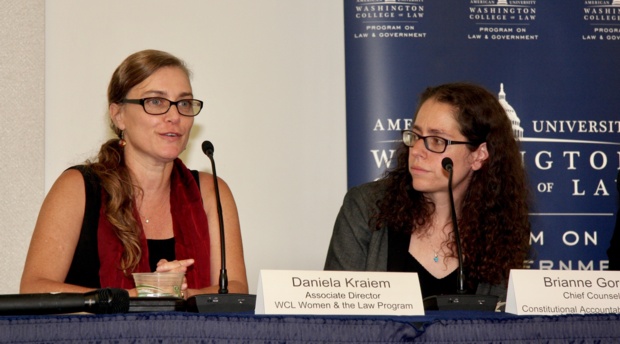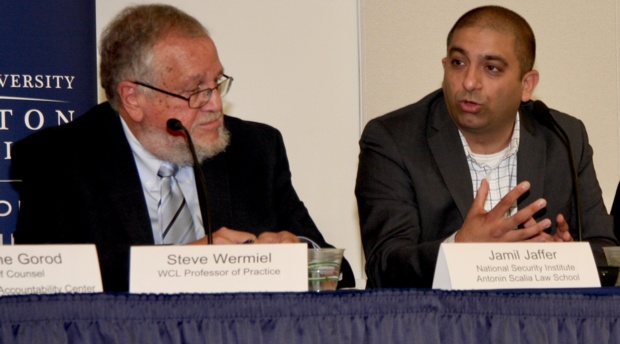
Program on Law and Government Hosts ‘The Kavanaugh Nomination: A Panel Discussion’
Sept. 5, 2018
On Wednesday, Sept. 5, American University Washington College of Law’s Program on Law and Government hosted a panel discussing the nomination of Judge Brett Kavanaugh to the U.S. Supreme Court.
“The Kavanaugh Nomination: A Panel Discussion” was moderated by AUWCL Professor and constitutional law expert Steve Wermiel, and featured Professor Daniela Kraiem, associate director of AUWCL’s Women and the Law Program; Brianne Gorod, chief counsel at the Constitutional Accountability Center; and faculty from George Mason University’s Antonin Scalia Law School: Jamil Jaffer, founder of the National Security Institute, and Assistant Professor Jennifer Mascott, who was previously a law clerk for Kavanaugh.
The panel promoted a dialogue between the panelists on various issues concerning Kavanaugh, including areas of opposition to his nomination. Topics of discussion included the potential impact his confirmation may have on women’s rights, administrative law, executive power, and advancing technologies, among others.

On whether Kavanaugh would rule to overturn Roe v. Wade, Kraiem said that though Kavanaugh stated during his confirmation hearing that Roe v. Wade has both jurisprudential value and real-world effects, that tells us little about how he may rule on the issue in the future.
"He believes that it is precedent. But precedent, of course, can be overruled," she said. "As a lower court judge, that was an incredibly important basis for his decision making. But as a member of the Supreme Court, all bets are off. We have to look at what he's said and done, both on and off the bench."
But Jaffer argued that Kavanaugh's adherence to precedent and application of the law "as it is" is what makes him a qualified nominee to fill the court's vacancy.
"It doesn't matter what he personally thinks about abortion, or presidential powers, or any other topic," Jaffer said. "What matters is, what does he understand the law to be and how will he apply that law to a case before him."
“The Kavanaugh Nomination: A Panel Discussion” was co-sponsored by the Women and the Law Program, AUWCL’s Office of Public Interest and Office of Special Events and CLE, 1L Integrated Curriculum, AUWCL’s Administrative Law Review, AUWCL’s American Constitutional Society, and the AU Legislation & Policy Brief.